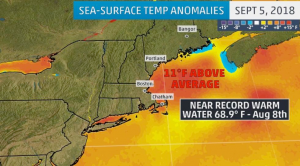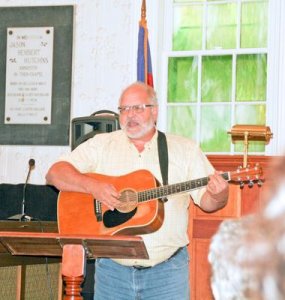When Bob Dylan released his album The Times They Are A-Changin’ in 1964, I don’t imagine sea level rise was on his mind. Although the opening verse of the title song tells us to “admit that the waters around you have grown” and we’d “better start swimmin’” or we’ll “sink like a stone.” Dylan’s metaphors were urging us to pay attention to what’s changing and be prepared to modify our behaviors. At the time it was a political message, not an ecological one. Well, here we are nearly 50 years later. Not only does the metaphor still ring true, but the words seem to have prophesized ecological changes happening around us.
Coastal communities are seeing the waters at our shore “growing” and overflowing their banks as sea level changes. Last fall, the Deer Isle archipelago saw water creep into harbor-side parking lots and come precariously close to inundating the causeway to our island. Those paying attention are now asking about the causeway’s ability to provide critical connections to the peninsula and the rest of the world. Whether it’s the coming and going of residents and visitors, or the critically important ability to transport lobster, this island’s top export, we best pay attention, adjust, and prepare for even higher sea levels lest we “sink like a stone.”
 Sea level change, runoff, and increased severity of storms are easy to observe. Other effects of our changing world are more insidious but equally important. This year, the water temperature in the southern Gulf of Maine is nearly 11 degrees warmer than usual. Residents of the Casco Bay islands are enjoying ocean swimming like never before. But that’s not a good thing for sea life in the region. Along with increasing temperature, we know that changes are happening in the chemistry of the ocean (like pH). This is troubling to the biological functions of plants, animals, and the ecosystem. While the consequences are not fully understood, you can bet it affects the marine critters that Maine harvests and depends on for its fisheries economy.
Sea level change, runoff, and increased severity of storms are easy to observe. Other effects of our changing world are more insidious but equally important. This year, the water temperature in the southern Gulf of Maine is nearly 11 degrees warmer than usual. Residents of the Casco Bay islands are enjoying ocean swimming like never before. But that’s not a good thing for sea life in the region. Along with increasing temperature, we know that changes are happening in the chemistry of the ocean (like pH). This is troubling to the biological functions of plants, animals, and the ecosystem. While the consequences are not fully understood, you can bet it affects the marine critters that Maine harvests and depends on for its fisheries economy.
Maine Center for Coastal Fisheries is concerned about these changes. We are working to connect people to their ecosystem, observe and understand what is happening around us, and prepare for change. We must ensure resiliency in our fisheries, so the coastal communities that depend on them can survive. Scientists need all of us to help understand what is happening. Maine Center for Coastal Fisheries is prepared to engage the people who live, work, and recreate in Maine so that all of our observations can contribute to policy and practice. Perhaps, if we pay attention, we can admit that “the times they are a-changin’.”
The Times They Are A-Changin’
Bob Dylan
Wherever you roam
And admit that the waters
Around you have grown
And accept it that soon
You’ll be drenched to the bone.
If your time to you
Is worth savin’
Then you better start swimmin’
Or you’ll sink like a stone
For the times they are a-changin’.
Who prophesize with your pen
And keep your eyes wide
The chance won’t come again
And don’t speak too soon
For the wheel’s still in spin
And there’s no tellin’ who
That it’s namin’.
For the loser now
Will be later to win
For the times they are a-changin’.
Don’t stand in the doorway
Don’t block up the hall
For he that gets hurt
Will be he who has stalled
There’s a battle outside
And it is ragin’.
It’ll soon shake your windows
And rattle your walls
For the times they are a-changin’.
Throughout the land
And don’t criticize
What you can’t understand
Your sons and your daughters
Are beyond your command
Your old road is
Rapidly agin’.
Please get out of the new one
If you can’t lend your hand
For the times they are a-changin’.
The curse it is cast
The slow one now
Will later be fast
As the present now
Will later be past
The order is
Rapidly fadin’.
And the first one now
Will later be last
For the times they are a-changin’
About the Author
 Paul Anderson is the Executive Director of Maine Center for Coastal Fisheries. Paul has over 30 years of experience working with Maine’s marine resources, at the intersection of science, policy, and community. He’s worked across the state of Maine, as well as abroad, in Ireland, South Africa, Namibia, the Philippines, and China. Paul holds a Bachelors and Masters degree in Microbiology from the University of Maine. When he’s not working for Maine’s fisheries, Paul is an active musician. He plays the mandolin, guitar, and piano, and is active in numerous bands, as well as WERU Community Radio.
Paul Anderson is the Executive Director of Maine Center for Coastal Fisheries. Paul has over 30 years of experience working with Maine’s marine resources, at the intersection of science, policy, and community. He’s worked across the state of Maine, as well as abroad, in Ireland, South Africa, Namibia, the Philippines, and China. Paul holds a Bachelors and Masters degree in Microbiology from the University of Maine. When he’s not working for Maine’s fisheries, Paul is an active musician. He plays the mandolin, guitar, and piano, and is active in numerous bands, as well as WERU Community Radio.
Photo Credit:
Tina Oddleifson, Penobscot Bay Press
Read the full article HERE.
